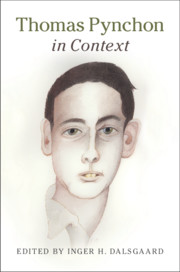Book contents
- Thomas Pynchon in Context
- Thomas Pynchon in Context
- Copyright page
- Contents
- Contributors
- Abbreviations
- Chronology
- Introduction
- Part I Times and Places
- Part II Culture, Politics, and Society
- Chapter 14 Family
- Chapter 15 Sex and Gender
- Chapter 16 Humor
- Chapter 17 Popular Culture
- Chapter 18 Music and Sound
- Chapter 19 Film and Television
- Chapter 20 Real Estate and the Internet
- Chapter 21 Politics and Counterculture
- Chapter 22 Drugs and Hippies
- Chapter 23 Ecology and the Environment
- Chapter 24 Capitalism and Class
- Chapter 25 War and Power
- Chapter 26 Conspiracy and Paranoia
- Chapter 27 Terror and Anarchy
- Chapter 28 Science and Technology
- Chapter 29 Mathematics
- Chapter 30 Time and Relativity
- Chapter 31 Philosophy
- Chapter 32 Religion and Spirituality
- Chapter 33 Death and Afterlife
- Part III Approaches and Readings
- Further Reading
- Index
Chapter 30 - Time and Relativity
from Part II - Culture, Politics, and Society
Published online by Cambridge University Press: 31 May 2019
- Thomas Pynchon in Context
- Thomas Pynchon in Context
- Copyright page
- Contents
- Contributors
- Abbreviations
- Chronology
- Introduction
- Part I Times and Places
- Part II Culture, Politics, and Society
- Chapter 14 Family
- Chapter 15 Sex and Gender
- Chapter 16 Humor
- Chapter 17 Popular Culture
- Chapter 18 Music and Sound
- Chapter 19 Film and Television
- Chapter 20 Real Estate and the Internet
- Chapter 21 Politics and Counterculture
- Chapter 22 Drugs and Hippies
- Chapter 23 Ecology and the Environment
- Chapter 24 Capitalism and Class
- Chapter 25 War and Power
- Chapter 26 Conspiracy and Paranoia
- Chapter 27 Terror and Anarchy
- Chapter 28 Science and Technology
- Chapter 29 Mathematics
- Chapter 30 Time and Relativity
- Chapter 31 Philosophy
- Chapter 32 Religion and Spirituality
- Chapter 33 Death and Afterlife
- Part III Approaches and Readings
- Further Reading
- Index
Summary
Thomas Pynchon’s novels have plenty to say about time. V. (1963) and Mason & Dixon (1997), in different ways, put history in conversation with the author’s own time. Time travel crops up in Vineland (1990), Against the Day (2006) and Bleeding Edge (2013). Gravity’s Rainbow (1973) pits determinism against randomness and novelty. Different ways of thinking about time are prominent in critical readings of Pynchon: This chapter describes some arguments about time as both theme and principle of narrative organization, and highlights some telling details of the novels themselves. Against the Day is important for readers interested in Pynchon and time because it is set in the closing decades of the nineteenth century and the early part of the twentieth, when H. G. Wells’ The Time Machine and influential contributions to the philosophy of time by Henri Bergson and William James appeared, Futurists and Cubists transformed the way art depicts time and movement, and modernism began to change how literature represents time.
Information
- Type
- Chapter
- Information
- Thomas Pynchon in Context , pp. 239 - 246Publisher: Cambridge University PressPrint publication year: 2019
Accessibility standard: Unknown
Why this information is here
This section outlines the accessibility features of this content - including support for screen readers, full keyboard navigation and high-contrast display options. This may not be relevant for you.Accessibility Information
- 1
- Cited by
